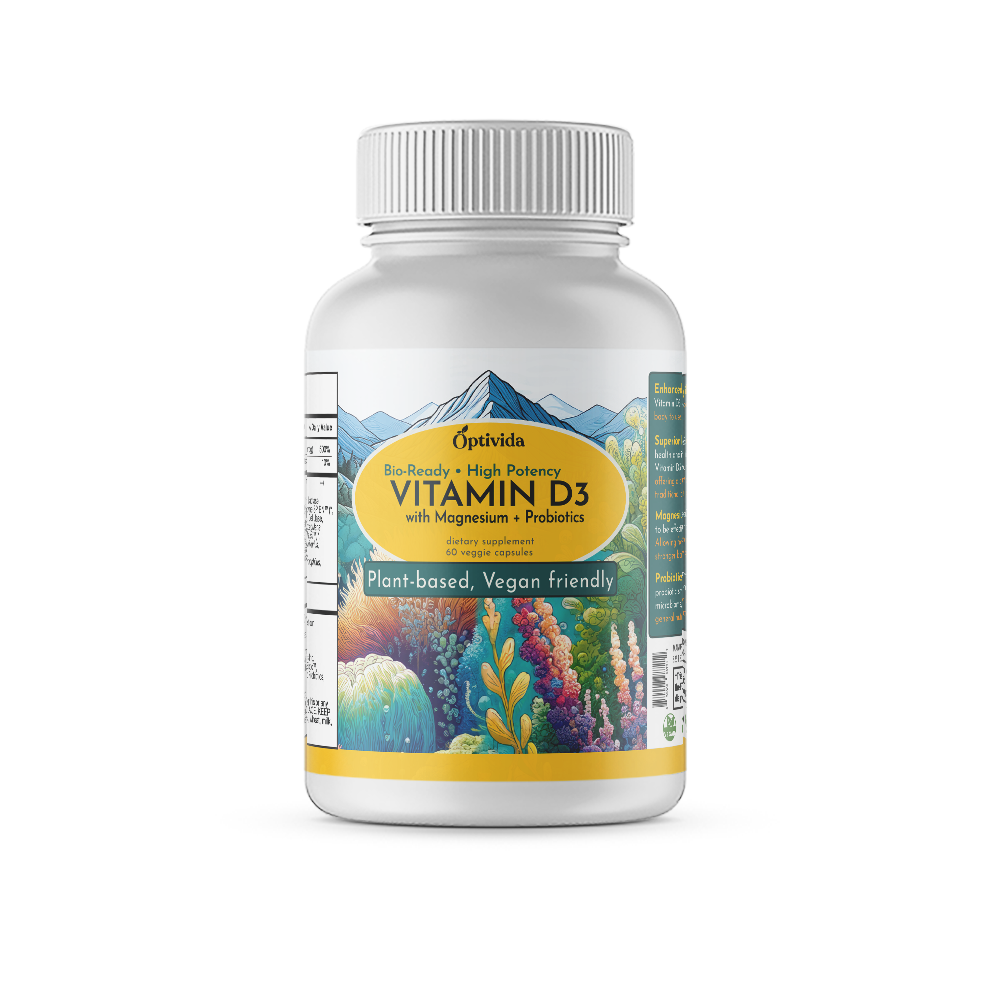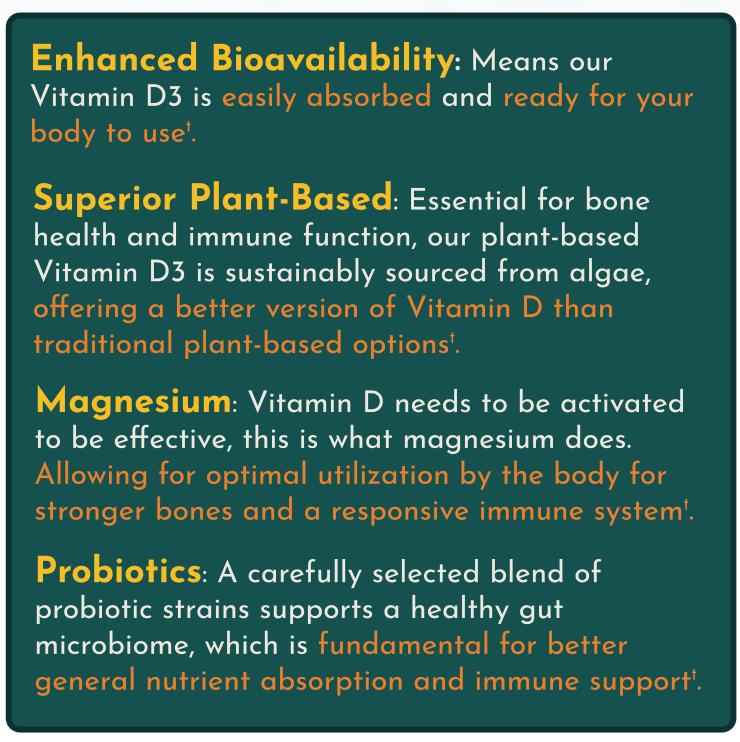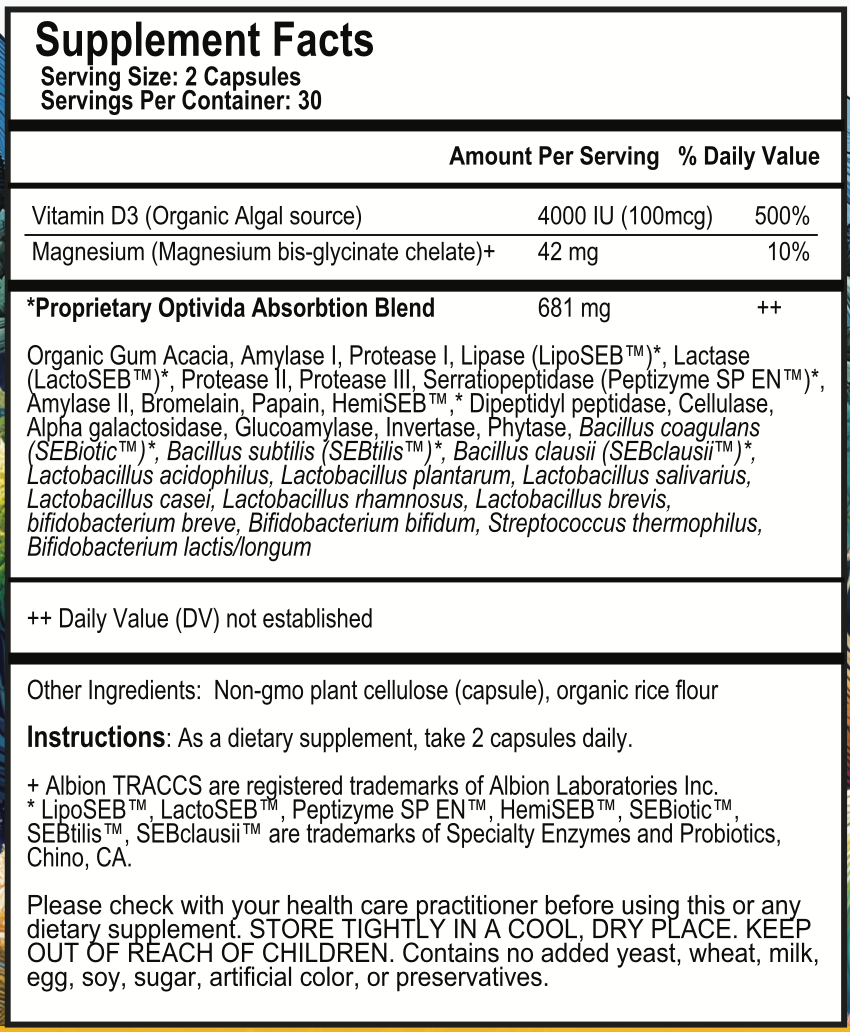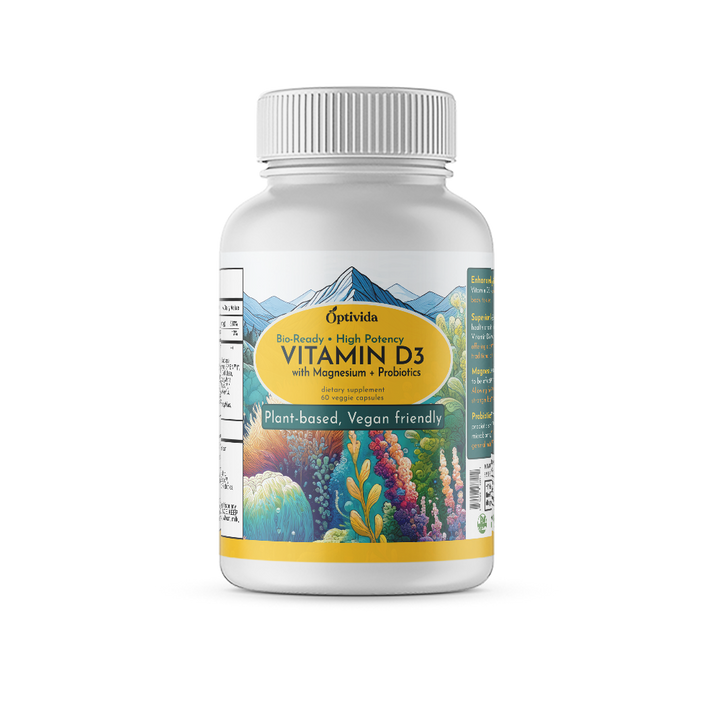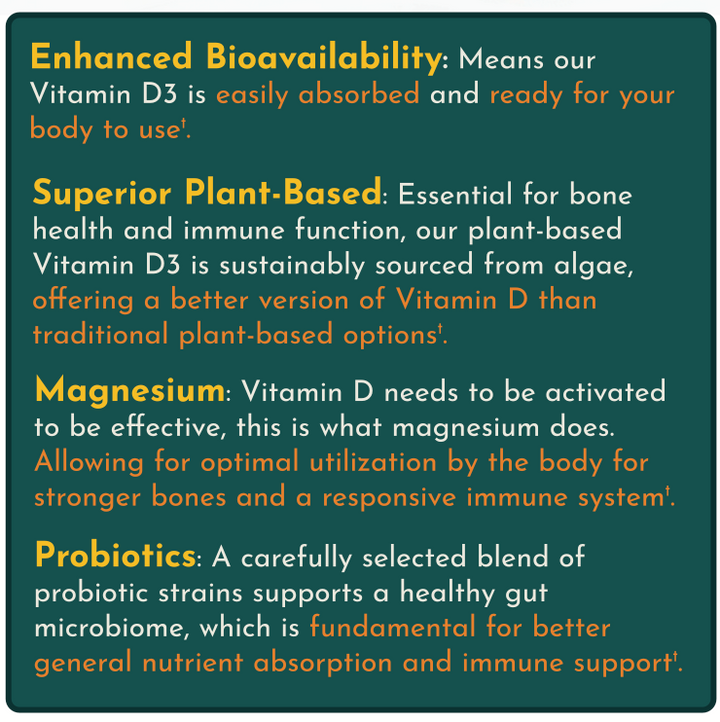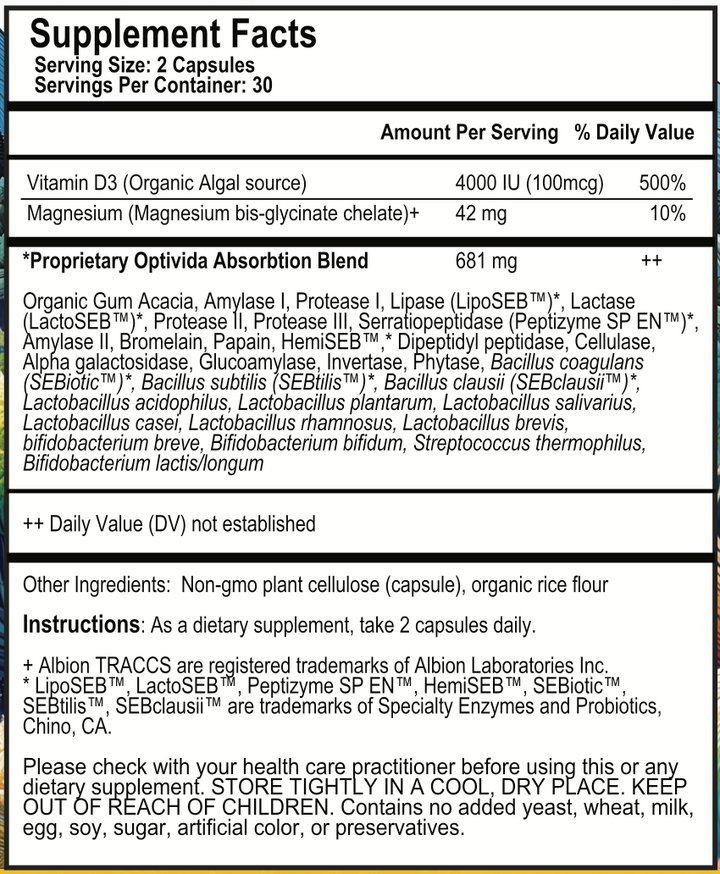Sunshine for Your Cells — Strength, Energy, and Immunity in One
-
Risk-Free Purchase – Guaranteed Refund
-
Clean ingredients
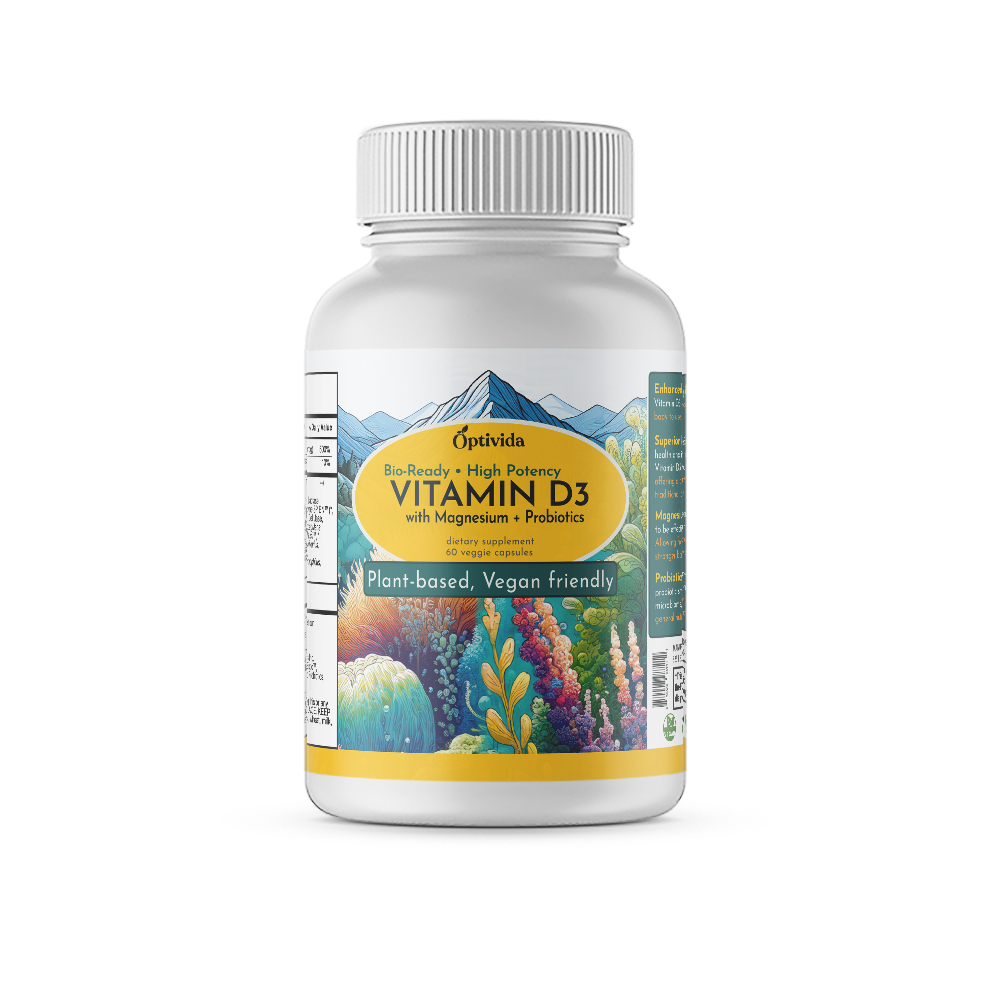
BONE & MUSCLE STRENGTH
Our plant-based D3 helps your body absorb and use calcium properly, supporting strong bones and muscles that stay active and steady as you age.
IMMUNE DEFENSE SUPPORT
Vitamin D plays a vital role in immune balance. When combined with magnesium and probiotics, it helps your body respond quickly and effectively to everyday challenges.
ENERGY & MOOD LIFT
Low sunlight and long hours indoors can leave you tired or low on motivation. Optivida Vitamin D helps restore your natural vitality—helping you feel brighter, more energetic, and more focused.
WHOLE-BODY ABSORPTION
Unlike ordinary D3, our formula combines plant-based D3 from algae with magnesium and probiotics for optimal activation and absorption, giving your body the nutrients it can actually use.
BONE & MUSCLE STRENGTH
Our plant-based D3 helps your body absorb and use calcium properly, supporting strong bones and muscles that stay active and steady as you age.
IMMUNE DEFENSE SUPPORT
Vitamin D plays a vital role in immune balance. When combined with magnesium and probiotics, it helps your body respond quickly and effectively to everyday challenges.
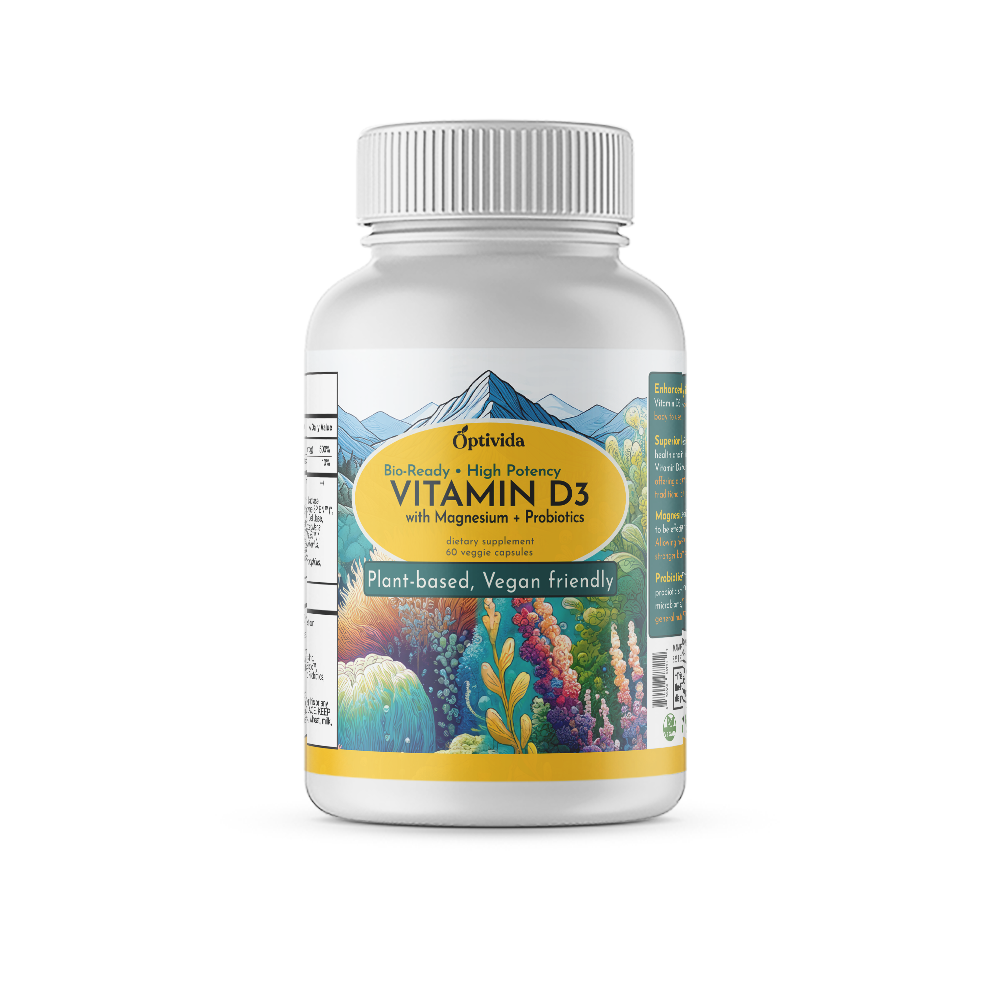
ENERGY & MOOD LIFT
Low sunlight and long hours indoors can leave you tired or low on motivation. Optivida Vitamin D helps restore your natural vitality—helping you feel brighter, more energetic, and more focused.
WHOLE-BODY ABSORPTION
Unlike ordinary D3, our formula combines plant-based D3 from algae with magnesium and probiotics for optimal activation and absorption, giving your body the nutrients it can actually use.
Supports bone and muscle strength naturally every day
Boosts mood and energy when sunlight is limited
Strengthens immune defenses year-round for daily protection
Gentle, vegan formula that your body absorbs easily

Others
Plant-based D3 sourced from sustainable algae
Includes magnesium for complete D activation
Contains probiotics for better nutrient absorption
No synthetic or lab-made ingredients
Non-GMO, dairy-free, and gluten-free
Clean, whole-food formula for real results
Learn More
NEW AND IMPROVED FORMULA: NOW 4,000 IU PLANT-BASED D3
Superior Plant-Based: Essential for bone health and immune function, our plant-based Vitamin D3 is sustainably sourced from algae, offering a better version of Vitamin D than traditional plant-based options.
Enhanced Bioavailability: Means our Vitamin D3 is easily absorbed and ready for your body to use.
Magnesium: Vitamin D needs to be activated to be effective, this is what magnesium does. Allowing for optimal utilization by the body for stronger bones and a responsive immune system.
Probiotics: A carefully selected blend of probiotic strains supports a healthy gut microbiome, which is fundamental for better general nutrient absorption and immune support.
Potent 4000IU: This super supplement has enough potency to provide you with your optimal daily requirements of vitamin D as well as some other vitamins and minerals, like potassium and iron.
Chart shows the average Plasma levels of Vitamin D across the subjects, comparing between baseline (initial) and following 7 days supplementation with 600iu per day of Vitamin D3V®. The average increase was 77.3%.
VegD3 is the only pure plant-based vitamin D3 that can be used as a 1:1 replacement for the animal sourced D3. From a sustainable algae source, it offers superior purity and quality to the lanolin D3. The fully traceable supply chain is free from issues involving pesticides and heavy metals. It is Vegan Society approved. This is the only organic crystal Cholecalciferol (Vitamin D3) for vegans.
The awareness of Vitamin D grew in 2020 for its role in supporting immune health. Studies on vitamin D and immunity grew over 25% in 2020 vs. 2019. Over 350 publications have evaluated the role of Vitamin D in reducing severe outcomes from compromised immune systems. Consumers are seeking vitamin D and now those practicing a vegetarian or vegan diet have a highly bioavailable option.
OPTIVIDA Vitamin D may be one of the only Vitamin D supplements that actually works completely in your body. By combining marine-based with magnesium and probiotics, your body can absorb and activate the vitamin D.
50% of Americans are Deficient: The American diet can supply only a portion of our daily dose of vitamin D, and those who live further north of the equator may receive little to no vitamin D from sunlight.
Plant-Based Supplement: This capsule supplement contains no animal products and is made from plant-based algae, making it the perfect supplement for vegan and vegetarian diets.
Safe to Use: This whole-food product is non-GMO, is dairy-free and gluten-free, and can be used by both men and women, especially those who are active or are 55 years or older. Optivida Health's Vitamin D never contains synthetic ingredients which can be less effective and may contain unregulated chemicals.
*These statements have not been evaluated by the Food and Drug Administration. These products are not intended to diagnose, treat, cure or prevent any disease. Consult your physician before using any supplement.
*These statements have not been evaluated by the Food and Drug Administration. These products are not intended to diagnose, treat, cure or prevent any disease. Consult your physician before using any supplement.
